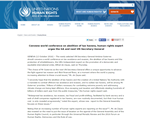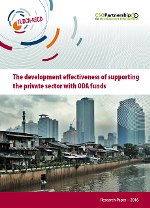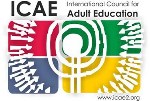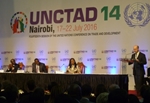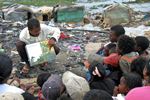Other news
Published on Fri, 2016-10-14 18:06
A United Nations human rights expert has called on newly elected United Nations Secretary-General (UNSG) Antonio Guterres to convene a world conference to discuss the issues of tax avoidance and evasion, the abolition of tax havens as well as the protection of whistleblowers. In a UN news release, the Independent Expert on the promotion of a democratic and equitable international order, Mr Alfred de Zayas (United States), said: "The choice of Mr Guterres as the next UN Secretary-General offers a unique opportunity to advance the fight against tax evasion and illicit financial flows, at a moment where the world is paying increasing attention to these crucial issues". |
Published on Tue, 2016-10-04 00:00
Corporate reporting can provide an essential contribution to monitoring the implementation of the 2030 Agenda for Sustainable Development, according to the UN Conference on Trade and Development (UNCTAD). This conclusion was highlighted in an UNCTAD Secretariat Note titled "Enhancing the role of reporting in attaining the Sustainable Development Goals: Integration of environmental, social and governance information into company reporting" prepared for a meeting of UNCTAD's Intergovernmental Working Group of Experts on International Standards of Accounting and Reporting (ISAR). ISAR, comprising accountancy experts, is holding its thirty-third session from 4-6 October. |
Published on Mon, 2016-09-26 14:03
It's had a very useful if sometimes controversial past and it will have great relevance for many more years ahead. Three decades ago, the Declaration "broke new ground in the struggle for greater freedom, equality and justice," remarked the UN High Commissioner for Human Rights, Zeid Ra'ad Al Hussein, at a session of the Human Rights Council on 15June, celebrating the 30th anniversary of the Declaration. |
Published on Sun, 2016-09-25 00:00
Several least-developed countries - Benin, Tanzania, and Cambodia among others - voiced their concern at the World Trade Organization on 22 September over the lack of progress in addressing their core issues such as the simplification of preferential rules of origin as promised in the Nairobi ministerial declaration (NMD), several participants told the SUNS. During a meeting of the WTO's Committee on Rules of Origin (CRO), the LDCs reminded the preference- granting developed countries as well as the developing countries declaring themselves in a position to do so to notify the measures they are required to undertake for simplifying the preferential rules of origin under the Nairobi ministerial declaration of December 2015. |
Published on Thu, 2016-09-01 18:55
Development funding is increasingly being channelled through Development Finance Institutions. These national institutions are particularly solicited when using development aid money to free up further investment, known as leveraging. When used well, these tools have the potential to allow sectors of developing countries’ economies that wouldn’t otherwise attract investment to strengthen and expand. However, this joint TUDCN-CPDE research paper highlights a number of alarming shortfalls in how these institutions operate that can seriously undermine international development goals. This new report, entitled ‘The development effectiveness of supporting the private sector with ODA funds’ examined nine Development Finance Institutions (DFIs). It is jointly produced by the CSO Partnership for Development Effectiveness (CPDE) and the TUDCN. Five case studies (available below) provided a background for the study which found that DFI practice is lacking in three vital areas : |
Published on Wed, 2016-08-17 22:32
The International Council for Adult Education (ICAE) announces the launch of the call for applications of the ninth edition of the ICAE Academy of Lifelong Learning Advocacy (IALLA) that will be held in Ouagadougou, Burkina Faso, from November 10 to 17, 2016. The ICAE Academy of Lifelong Learning Advocacy is the main international training programme that the International Council for Adult Education (ICAE) has created with the aim of broadening the vision on adult learning and helping new leaders acquire advocacy skills through a participatory methodology that includes an interlinkage analysis within and beyond the field of adult learning and education, and promoting networking as an effective mechanism for collective learning. Since its creation in 2004 they have had a growing number of applicants from all regions and at this moment there are 222 IALLA graduates from 74 countries of all regions. |
Published on Fri, 2016-08-12 12:30
Vulture funds are inherently exploitative, since they seek to obtain disproportionate and exorbitant gains at the expense of the full realization of human rights, particularly economic, social and cultural rights, and the right to development, the UN Human Rights Council Advisory Committee has said. In its latest report on the activities of vulture funds and their impact on human rights, the Advisory Committee said that seeking the repayment in full of a sovereign debt from a State that has defaulted, or is close to default, is an illegitimate outcome. |
Published on Thu, 2016-08-04 15:08
From 11-20 July 2016, the 2016 meeting of the High-Level Political Forum on Sustainable Development (HLPF) took place at UN Headquarters in New York. Under the auspices of the UN Economic and Social Council (ECOSOC), the meeting focused on the theme of “Ensuring that no one is left behind.” It was attended by nearly 1500 Member States, Major Groups and other stakeholders (MGoS), and intergovernmental and UN organizations. In addition to the official program, 37 side events were organized. According to the Rio+20 outcome document and G. A. Resolution 67/290, the HLPF has the mandate to follow-up and review the 2030 Agenda for Sustainable Development and the Sustainable Development Goals (SDGs). Since this was the first meeting after the adoption of the SDGs, 22 countries offered voluntary reviews to the implementation of the goals, focusing mostly on how countries are preparing for and managing their transition towards the implementation of the 2030 Agenda. |
Published on Fri, 2016-07-29 09:59
Due to UNCTAD’s decidedly pro-South and uncompromising development-focused mission, its quadrennial conferences have traditionally been North –South showdowns. Coming a few months after the adoption of the ambitious and universal 2030 Agenda for Sustainable Development and its 17 associated goals, the theme of the XIV Quadrennial Conference of UNCTAD (the United Nations Conference on Trade and Development) was “From Decisions to Actions.” There was, therefore, reason to expect that this time members would bridge their differences for the sake of reinforcing mandates of the organization critical to the Agenda’s implementation. But that was not the case, and the dynamics were a lot more akin to the difficult ones witnessed in the inaugural Financing for Development (FFD) Forum last April. |
Published on Thu, 2016-07-07 16:23
In all societies, from Northern Europe to South Saharan Africa, there are people that are so isolated, excluded and impoverished that they live in a state of extreme poverty that is passed from one generation to the next. They do not only live in material deprivation but also lack political voice and social capital and for these reasons they are often neglected or overlooked by politicians, service providers and policy-makers. The obstacles that maintain them in poverty are therefore never properly understood nor addressed, with the result that the human rights violations that are the cause and the consequence of their extreme poverty continue unabated, and that the human capital they represent continues to be wasted. |
SUSCRIBE TO OUR NEWSLETTER

